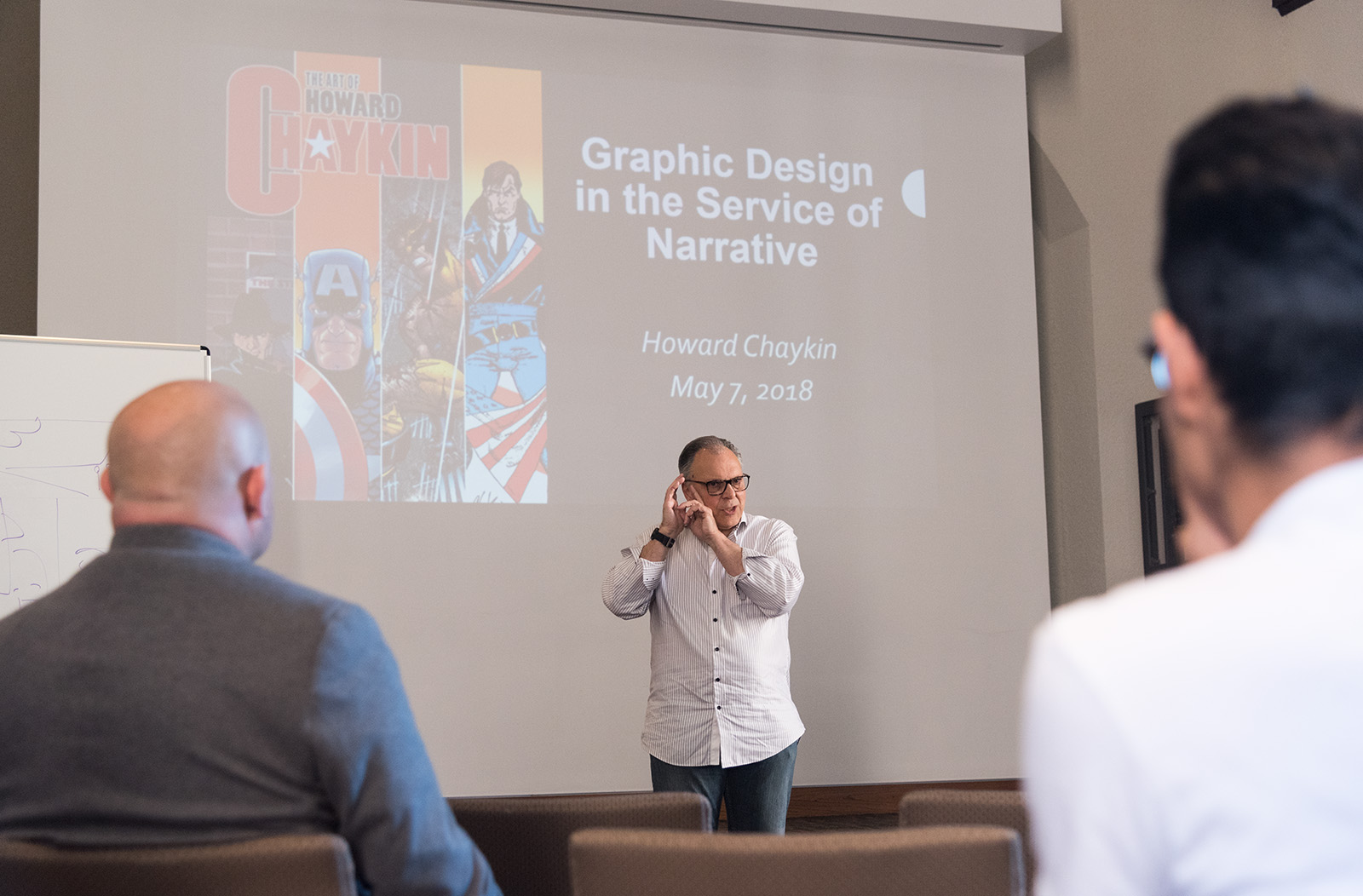Panel discusses influence of historical themes in contemporary comics

Comic book creator Howard Chaykin spoke at the workshop, “Graphic Design in the Service of Narrative,” part of ComicCon 2018. The event, sponsored by UCLA’s Center for Medieval and Renaissance Studies, spanned Monday and Tuesday at Royce Hall. (Daniel Leibowitz/Daily Bruin staff)
By Kaia Sherry
May 8, 2018 8:23 p.m.
Comic book creator Howard Chaykin said kindness is an overrated quality in comic book heroes.
“I don’t like reading about perfect people, I like flaws,” he said.
Chaykin shared similar takes on conventional superheroes and the comic book industry as part of a panel at Monday’s portion of UCLA ComicCon 2018 in Royce Hall.
UCLA ComicCon 2018, sponsored by UCLA’s Center for Medieval and Renaissance Studies, aimed to showcase the influence of historical themes in modern media, specifically through the medium of comic books. Massimo Ciavolella, director of the CMRS and Italian and comparative literature professor, said comic books display the past in a way that brings one’s eyes immediately to the essence of the period being presented.
“Comic books are a successful teaching tool because the image connects with the discourse in a way that’s much more immediate than simply reading a book,” Ciavolella said. “The accessibility comes from the immediacy of the image on the page.”
Kristina Markman, program coordinator of the UCLA Public History Initiative and adjunct professor in the history department, brought the event to the attention of CMRS. She organized the event in conjunction with a course she presently teaches entitled Topics in Medieval History: Myth of Superhero, Then and Now, which analyzes the evolution of the heroic ideal in Western humanistic tradition and the modern comic book.
The event consisted of two parts: a panel with three guest speakers and a hands-on workshop the next day in Royce Hall. The guest speakers featured were Chaykin, Conor McCreery and GMB Chomichuk.
Chaykin, a veteran in the industry, is one of the principal architects of the modern comic book, Markman said.
Chomichuk, known for comics such as “Midnight City” and “Infinitum,” recently illustrated “Will I See?,” a book grappling with cases of murdered children in Canada.
The panel, conducted by Markman, revolved around questions of viewing history through modern media and the comic book world as a whole. The first question addressed the panelists’ careers and their subsequent paths into the comic book industry, as well as the inspirations for their works.
Chaykin described the trove of comics he stored in a refrigerator box when he was four, which ultimately inspired him to create them, while McCreery revealed his present career was unexpected considering his previous experiences as a journalist and entrepreneur. Logan Patton, a third-year English and African American studies student, said she felt particularly inspired by McCreery’s path in discovering his true passion for comics.
“As a third year, I’m trying to figure out what I want to do after graduation and hearing the steps that other people have taken, especially when it’s not as conventional or linear as people make it seem, is very inspiring,” Patton said. “Sometimes it’s going to take you 30 years to figure out what you want to do, and that’s fine.”
The panel then moved on to discuss historical themes present in their work. McCreery discussed his 12-issue series “Kill Shakespeare,” which draws upon medieval themes by way of uniting characters from disparate Shakespeare tales into one universe – basically what would happen if Shakespeare and “Game of Thrones” had a one night stand, he said.
The conversation moved to discuss the reception of the hero figure prominent in comics. Chaykin said he enjoys characters who engage in casual mischief and rejects superheroes like Batman, who suffer from the wounded hero archetype. He views the caped crusader as just a rich man who had one bad day when he was 8 years old.
The panel closed on a philosophical note, delving into why readers relate to fantastical themes and why they remain so relevant in media. McCreery discussed the accessibility of love stories from the Renaissance era, postulating that perhaps it is easier to relate to simple love stories in today’s more complex romantic landscape.
The event as a whole ended with audience questions, many of which inquired about the panelists’ beliefs regarding the essence of comic books. Chomichuk responded by highlighting the more optimistic themes in his own work.
“In my comics, I believe there’s an inherent goodness we can find again,” Chomichuk said. “It’s a humanistic idea that’s baked under various levels of obfuscation, but it’s always there.”

